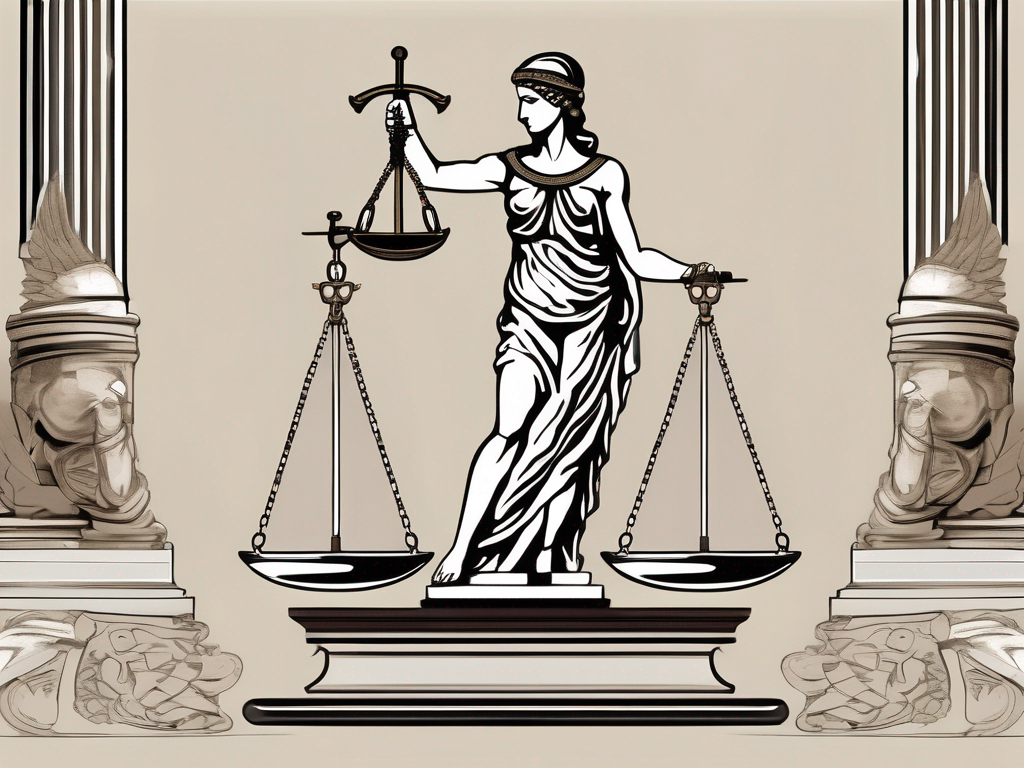The Greek pantheon is a fascinating realm filled with an array of captivating gods and goddesses, each possessing their own unique powers and stories. Among these mythical figures, one goddess stands out – Themis. Known as the personification of divine order, Themis holds a significant place in Greek mythology. Let’s delve into the world of Themis and uncover the secrets surrounding her existence.
Understanding the Role of Themis in Greek Mythology
Themis is a goddess closely associated with the concept of divine order. She is often depicted as a wise and just deity, embodying the ideals of fairness and balance. To truly understand the nature of Themis, we must explore her origin and the role she played in maintaining the harmony of the cosmos.
The Origin of Themis
In Greek mythology, Themis is believed to be one of the Titans, the divine beings who ruled before the Olympian gods. As the daughter of Uranus (the sky) and Gaia (the earth), she is a part of the ancient order that predates Zeus and his divine siblings.
Themis’ birth was not without its own share of drama. According to mythological accounts, Uranus feared the power of his children and imprisoned them within Gaia’s womb. However, Gaia, in her pain and anger, conspired with her children to overthrow Uranus. Themis, being a part of this rebellion, played a significant role in the dethroning of Uranus and the establishment of a new order.
As one of the Titans, Themis possessed immense power and wisdom. She was known for her ability to foresee the future and her deep understanding of the natural laws that governed the universe. These qualities made her a respected figure among both gods and mortals.
Themis and the Divine Order
Themis played a crucial role in upholding the divine order. She was responsible for ensuring that laws and customs were followed, and justice was served accordingly. With Themis by his side, Zeus himself relied on her wisdom and counsel when making important decisions.
Themis’ influence extended beyond the realm of gods. She was revered by mortals as the protector of social order and the enforcer of justice. It was believed that she inspired the establishment of human laws and guided rulers in their pursuit of a just society.
Themis’ commitment to fairness and balance was unwavering. She was known to be impartial, never swayed by personal biases or emotions. Her judgments were based solely on the merits of the case, ensuring that justice was served without favoritism.
Despite her association with order and justice, Themis was not without her own struggles. Like many other gods and goddesses in Greek mythology, she faced challenges and conflicts that tested her resolve. These stories of triumph and resilience only served to enhance her reputation as a symbol of righteousness.
In conclusion, Themis is a goddess of immense importance in Greek mythology. Her role in maintaining the divine order and upholding justice cannot be overstated. With her wisdom and impartiality, she continues to inspire both gods and mortals to strive for fairness and balance in all aspects of life.
The Symbolism of Themis
Themis, the Greek goddess of divine order, is a powerful deity whose essence is encapsulated through various symbols. Two symbols, in particular, stand out – the scales of justice and the blindfold. These symbols not only represent Themis’ role in the dispensation of justice but also carry deeper meanings that reflect the ideals of fairness and impartiality.
The Scales of Justice
One of the enduring symbols associated with Themis is the scales of justice. These scales hold great significance as they represent the delicate balance required in the administration of justice. Just as the scales are used to weigh evidence, Themis, with the scales in her hands, ensures that every decision is made with impartiality and careful consideration. The scales serve as a reminder that justice should be meted out based on a fair evaluation of facts and evidence, free from any personal bias or prejudice.
Moreover, the scales of justice also symbolize the importance of proportionality in the legal system. By weighing the evidence on both sides, Themis ensures that the punishment or reward is commensurate with the actions committed. This symbolizes the idea that justice should not only be fair but also balanced, taking into account the gravity of the offense and the impact it has on society.
The Blindfold and its Significance
Another powerful symbol associated with Themis is the blindfold that she wears. This blindfold holds deep significance and serves as a visual representation of her objectivity and lack of bias. By covering her eyes, Themis symbolizes that justice should be blind, not influenced by external factors such as wealth, power, or social status.
The blindfold worn by Themis signifies that she views each case with an unbiased perspective, ensuring that every individual, regardless of their background or circumstances, is treated fairly and equally under the law. It represents the ideal that justice should not be swayed by personal opinions or prejudices but should be based solely on the merits of the case and the principles of law.
Moreover, the blindfold also serves as a reminder that justice should not be influenced by appearances or superficial factors. By covering her eyes, Themis emphasizes the importance of looking beyond surface-level characteristics and focusing on the truth and facts presented in each case. This symbolizes the idea that justice should be based on objective analysis and evaluation, rather than subjective judgments.
In conclusion, the symbols of Themis, including the scales of justice and the blindfold, are not merely decorative elements but carry profound meanings. They represent the ideals of fairness, impartiality, and objectivity that are essential in the administration of justice. Through these symbols, Themis reminds us of the importance of upholding these principles in our legal systems, ensuring that justice is served for all.
Themis in Ancient Greek Literature
The influence of Themis extends beyond just her role in the divine order. She is a prominent figure in various works of ancient Greek literature, leaving an indelible mark on the minds of readers throughout the ages.
Themis, the goddess of divine law and order, holds a significant place in the rich tapestry of ancient Greek literature. Her presence in the literary works of renowned poets and authors serves as a testament to her enduring influence and importance.
Themis in Homer’s Works
Homer, the revered poet of ancient Greece, mentions Themis in his epics, including the Iliad and the Odyssey. In these texts, Themis’s presence serves as a reminder of the importance of law and order in society, acting as a guiding light for both mortals and immortals alike.
In the Iliad, Themis is depicted as a divine force that upholds justice and maintains the balance of power among the gods. She is often invoked as a source of wisdom and guidance, ensuring that the laws of the divine realm are upheld and respected.
The Odyssey, on the other hand, portrays Themis as a symbol of justice and fairness in the mortal world. She is seen as a beacon of hope for those who seek righteousness and a deterrent for those who would defy the natural order of things.
References to Themis in Hesiod’s Theogony
Hesiod’s Theogony also offers valuable insights into the significance of Themis. Her role as a divine counsel and her connection to Zeus are expounded upon, painting a vivid picture of her importance within the pantheon.
In Theogony, Themis is portrayed as one of the Titans, the divine beings who ruled before the Olympian gods. She is described as the daughter of Uranus (the sky) and Gaia (the earth), emphasizing her close ties to the natural world and the cosmic order.
Themis’s association with Zeus, the king of the gods, further highlights her importance. She is often depicted as his second wife and the mother of the three Horae, the goddesses of the seasons and natural order. This connection solidifies her role as a mediator and advisor to Zeus, ensuring that justice and order prevail in the divine realm.
Throughout Hesiod’s Theogony, Themis’s wisdom and counsel are praised, emphasizing her role as a divine figure who brings harmony and balance to the cosmos. Her presence in the narrative serves as a reminder of the importance of upholding the laws and maintaining order, both in the divine realm and the mortal world.
The Influence of Themis on Modern Society
Even in the present day, the influence of Themis can be observed in various aspects of our society. From legal and judicial iconography to popular culture, Themis continues to leave an enduring impact.
Themis in Legal and Judicial Iconography
In legal and judicial settings, Themis is often depicted as a dignified figure holding the scales of justice and wearing her iconic blindfold. This representation serves as a reminder of the principles of fairness and equality that underpin our legal systems.
Themis in Popular Culture
Beyond the realms of law and order, Themis’s influence has seeped into popular culture. From books to movies, her character has been adapted and reimagined countless times, further perpetuating her mythical status and captivating audiences around the world.
The Temples and Cult of Themis
Themis’s impact is not limited to abstract concepts and compelling tales. Throughout ancient Greece, numerous temples were erected in her honor, serving as a place of worship and a testament to her enduring legacy.
Worship and Rituals Associated with Themis
Worshipers of Themis would gather in temples dedicated to her, engaging in rituals and ceremonies to show reverence for the goddess. These sacred practices aimed to honor her as the guardian of divine order and to seek her wisdom in matters of justice.
Architectural Marvels Dedicated to Themis
The temples built to honor Themis were often architectural marvels, reflecting the grandeur and importance of the goddess. These structures stood as tangible reminders of her enduring presence and the values she represented.
As we uncover the secrets of the Greek goddess Themis, we are reminded of the timeless importance of justice, order, and balance in our lives. Striving for fairness and equality, guided by the symbolic scales and blindfold, we can embody the spirit of Themis in our own actions, ensuring a harmonious existence for all.












